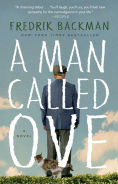My first reaction to this bestselling debut novel was that it was a pleasant read, but not particularly substantial. Aside the characters’ ages and the book’s length, I thought it read like a book for ten- to twelve-year-olds. I was surprised my book club had chosen it and afraid we’d have nothing to talk about when we met.
I was wrong.
We had quite a discussion about the subtlety with which Backman unfolded his characters and how they might reflect Swedish society. Although a couple of us complained about the overly cute chapter titles, we all enjoyed reading this story of a grumpy middle-aged man who has just about had it.
Although Ove is only 59, he comes across as much older. Recently laid off, he continues his engraved-in-stone routines, such as inspecting the neighborhood every morning to make sure everyone is following the rules, and fills in the empty hours with trying to kill himself. He complains about everything, from a neighbor’s dog relieving itself on his paving stones to the way computers and espresso machines are destroying peoples’ minds.
Needless to say, I identified with him. Not about dogs or computers or espresso machines, but I’ve gotten more and more grumpy about other trends, like increasingly reckless drivers on my local streets or—well, I’ll save the specifics. And I’m completely with Ove on the dire lack of practical skills among most people today. Since home ec and shop classes were done away with, too many people don’t know how to cook a meal, hem a skirt, use a stick shift, or rewire a light.
Don’t get me started.
Things start to change for Ove when a young family moves into the neighborhood and refuse to be put off by him. A scrappy feral cat adopts him in spite of his efforts to drive it off. Another neighbor asks him to bleed her radiators, and word gets out about his competence with tools.
Backman gradually fills us in on Ove’s background, the influence of his father, what he learned about work, meeting and wooing his wife. It doesn’t feel like a tease, yet the careful parsing out of details takes the reader deeper and deeper into this one man’s character, making it impossible not to care about him.
One man, but he’s also an aspect of us all. Not the grumpiness, necessarily, but the desire for a good life, the attempt to control what can be controlled, the difficult balance between solitude and society.
I still think a ten-year-old could read this and get something out of it, yet there is much here for an adult to ponder as well.
Have you changed your mind about a book you’ve read, perhaps after you finished it or as a result of discussing it with others?

Just finished this book a few days ago. It took a while to draw me in. By the end, I saw myself, my husband, and all his Scandinavian family in Ove. I also loved the way community fell apart and reformed — a reminder of its fluidity and importance in giving life meaning.
I had a similar response. The story (audio version) grew on me after a while, and I ended up really enjoying it. Good to read a book like this sometimes, after more serious (and often depressing) work. Enjoyed Backman’s “Britt-Marie Was Here,” too. Needed that after the painful “A Little Life” by Yanagihara. “Britt-Marie” was another book that grew on me after a while. Somewhat a female version of Ove, but that was fine with me.